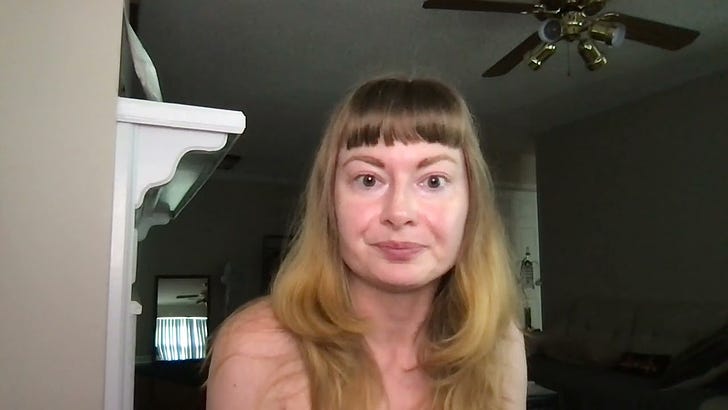Welcome to Sex and the State, a newsletter about power. I’m a writer working on decriminalizing and destigmatizing all things sex. I use evidence and stories to interrogate existing power structures to propose better ways of relating. To support my work, buy a guide, buy a subscription, follow me on OnlyFans, or just share this post!
~~~~~
If you’d rather watch me read this post:
Sorry, not sorry for the clickbait headline. It’s not masculinity itself that’s the trap, actually.
So my friend reacted to my What's wrong with native-born men? post by suggesting native-born men… act more gay.
My paraphrase:
Why does anyone hold onto an idea about how things "should" be that doesn't fit reality or serve their efforts to thrive? Is it only fear?
Maybe men need to see that changing society to put less pressure on them to provide will benefit them.
Maybe if we were less atomized or if there were more direct exposure to "alternative" ways of living or if there was more representation in media of non-normative families, straight men would feel less obligated to these systems. Queer families are inherently untethered from traditional gender roles (although they often recreate them) and, in my experience, tend to have a more extended, close family dynamic (found family).
I was reminded of a documentary, "The Mask You Live In." The main point is to show how the indoctrination of boys into a certain narrow version of masculinity in the US has created the suffering in men that you describe. The solution is teaching boys and men to value and feel safe experiencing more feminine qualities: emotional awareness, intimacy, empathy. What serves us all is openness and closeness.
I agree with all that, and my friend asks a great question. Why does anyone hold onto an idea about how things "should" be that doesn't fit reality or serve their efforts to thrive?
I believe there’s a certain epistemic closure around masculinity that insulates it from reform or escape.
In my experience, many men can't see expectations around masculinity as something they can accept, reject, or modify. They see their conception of masculinity and its requirements as unassailable, universal, capital-T “Truth." They can't conceive of a world in which their conception of masculinity can change to better serve them and the world.
And I empathize. A world with no or less “Truth” is extremely frightening, unmooring, and easily leads to nihilism. That’s a walk I had to take, and it was hard as hell.
It makes me wonder whether epistemic closure is more masculine- or feminine-coded.
But I think it’s more/also that there’s a strong cultural narrative around femininity being something women can and should reject or modify to better meet our needs collectively and individually. Mary Tyler Moore, feminism, etc. is, fundamentally, a re-evaluation and/or rejection of existing cultural scripts about the moral obligations of womanhood.
But the cultural narrative around masculinity being something men can and should reject or modify to better meet their needs collectively and individually isn’t merely weaker. It’s also heavily, heavily stigmatized.
A fundamentally misogynistic society shames men who perform femininity far more than women who perform masculinity. Women wearing pants? Cool. Men wearing dresses? Disgusting, shameful, gross. Women kicking ass? Badass. Men crying? Pathetic. All this is in flux, of course. There’s progress (straight men wearing dresses to award shows) and backlash. But the fundamentals remain.
And it’s not just men who police masculinity, it’s women too.
There’s no masculine equivalent to feminism. Men’s rights activists challenge misandry, sure. But feminism seeks to eradicate sexism, not to reinforce it by merely propping up women relative to men. (Unfortunately some strains of feminism do reinforce sexism by merely propping up women relative to men, but they don’t represent the movement as a whole.)
Neither feminism nor men’s rights is doing all that much, all that effectively, to evolve our conceptions of masculinity. There’s so much less thinking, vocabulary, and activism around evolving masculinity compared to femininity.
So, in sum, I think it is fear that causes people to commit to an idea about how things "should" be that doesn't fit reality or serve them. It’s fear of a world in which men aren’t men and women aren’t women, because that points to a world in which many more things previously understood as immutable are in fact up for debate.
A biological basis for not just sex, but gender as well, is simple, stable, and comforting. It’s like sitting inside a box with spikes, not particularly pleasant to be in but less frightening than what you imagine might be outside.
Ambiguity is unpleasant and scary. Change is unpleasant and scary.
And when men do anything as individuals to push back against, question, shove off, or evolve masculinity, they are punished, by men and women alike, severely.
So it is fear, but it’s not unreasonable or unfounded.
What I think men need, among many other things, is safety. They need to feel safe enough to merely begin to question gendered expectations. Men and women need to stop castigating men who fail (or don’t try hard enough) to meet gendered expectations. We need to make it safer to contemplate a world with less, or no, capital-T “Truth.” I’d like to see us work toward building a society in which everyone knows that every person has intrinsic worth and value regardless of how well they’re conforming to expectations, gendered or not. I want every person to believe that people are the point. Systems of belief should always serve people, not the other way around.
I don’t know how to get there. But I think acknowledging and understanding where we are is step-one.














Share this post